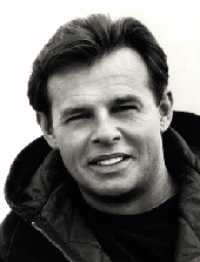Sammy Kershaw is typically blunt about his new album, Maybe Not Tonight. "I think it's probably the best thing I've ever done," he says. After the chart-topping triumph of "Love Of My Life" from his last release,1997's Labor Of Love, those are heady words indeed for a star with a string of platinum and gold albums to his credit.
Since catapulting to the forefront of 'the contemporary country scene in' 1991 , Kershaw has been revered as a true-to-his-roots honky-tonker with a gift for telling real-life tales. But "Love Of My Life" helped focus attention on one of Kershaw's biggest if not, in the past, fully evident gifts: his timeless talent as a singer of classic ballads.
"I've always been a ballad singer, really," he explains. "Yet my career hasn't been built on ballads. It's been mostly uptempo stuff. But I think a lot of people are going to like this new album when they hear it, and see that it is a little different."
That difference is signaled by the first track on Maybe Not Tonight: his duet with Lorrie Morgan on the title tune, sure to be one of 1999's memorable vocal-events. It's a song and performance that goes straight to the heart, and it's matched by such other stirring ballads as ''Without Strings," "Love Me, Loving You," "When You Love Someone," "How Can I Say No," 'Look What I Did To Us" and "How Much Does The World Weigh."
Kershaw credits Mercury Nashville Senior Vice President of A&R Keith Stegall with "finding a way to bring something else out that I hadn't brought out yet. It might have been the type of songs we cut that did that. I don't really know, and I don't really question it," Kershaw says. But he does assert that" Keith Stegall saved my career."
While Kershaw and Stegall have opened up new dimensions to Kershaw's artistry, Maybe Not Tonight will also satisfy fans of Sammy's upbeat country boy sensibility as previously heard on hits like"Cadillac Style, " "Queen of My Double Wide Trailer, " " National Working Woman's Holiday" and "Third Rate Romance." He once again revives a classic hit on "More Than I Can Say," a chart-topper for Bobby Vee in 1961 and Leo Sayer in 1980, while also displaying his gift for charming love songs on "Me and Maxine." His penchant for sly humor continues with "Ouch," and as always, Sammy delivers yet another scorching honky-tonk rave-up on "Louisiana Hot Sauce," which also pays tribute to his beloved home state.
Growing up in the heart of Cajun Country, Kershaw learned his craft and many of his life's biggest and toughest lessons early on, following the death of his father when Sammy was 11. Working a variety of jobs by day while playing roadhouses at night to support his family, he opened shows for stars like Ray Price, Merle Haggard and George Jones while barely into his teens. When the pressures of growing up fast took their toll in the form of a serious drug and alcohol problem, he quit his bad habits cold turkey in 1988, and took a break from music to work as a remodeling supervisor at Wal-Mart.
"I finally put my family first. I'd never done that before in my life," elains Sammy. "So I guess. The good Lord said, 'the boy's ready, because he finally knows what's important'." His reward came when Mercury heard one of his tapes in 1990, and launched the singer to immediate success and acclaim the following year.
After decades of hard work and daunting tribulations, Kershaw now enjoys the blessings bestowed by his career. He maintains his office on an 80-acre Farm just outside of Nashville, where good old-fashioned labor and the comfort of a refuge where he can unwind provide an ideal counterpoint to his life as a recording artist and performer. "If you're having a bad day, and something goes wrong, you can walk outside, go ride a horse, go fishing, 'you cn do whatever you want, take a hike up in the woods. When you get back, you're not upset any more," he observes.
He's also devoted himself to sharing the fruits of his success with the Sammy Kershaw Foundation Of Acadiana, based in a 100-year-old building Sammy is currently remodeling in his hometown of Kaplan, LA. An annual concert and accompanying golf and softball tournaments are just one of the many fundraising activities Kershaw undertakes for the Foundation, which devotes its efforts to giving kids a helping hand. "We build baseball fields, remodel old baseball fields, buy winter coats and milk and diapers for kids," he explains. "We help abused kids, kids who are sick, kids with heart problems and eye and hearing problems. We do a whole lot, and' it's all for kids."
It's all part of the way that Sammy, uses the lessons he's learned to enhance his music, his life, and the lives of others. "After all the things I've lived through, it's finally all coming together, and showing me why things happened. Everything happens for a reason," he concludes. "And now I'm finally able to look at all the pieces of the puzzle, and see all the good and bad that happened to me, and see why it happened, and where I am going in my life."
